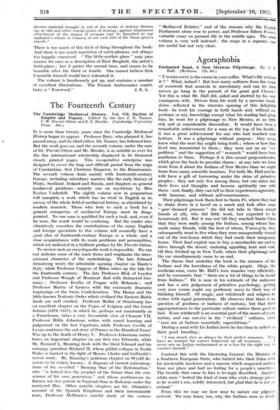The Fourteenth Century
IT is more than twenty years since the Cambridge Mediaeval History began to appear. Professor Bury, who planned it, has
passed away, and its chief editor, Dr. Tanner, has followed him. But the work goes on, and the seventh volume, under the care of Dr. Previte-Orton and Mr. Brooke, is as notable as ever for the fine international scholarship displayed in its thousand closely printed pages. This co-operative enterprise was designed to cover the long and difficult period from the reign of Constantine, first Christian Emperor, to the Renaissance. The seventh volume deals mainly with fourteenth-century Europe, including subsidiary matters like the early history of Wales, Scotland, Ireland and Russia, and chapters on general Mediaeval problems—notably one on mysticism by Miss Evelyn Underhill. The eighth volume now in preparation will complete a work which has no rival in English in its survey of the Whole field of mediaeval history, as elucidated by mOdern research. Those who look to such a book for a general" conspectus of mediaeval Europe must be disap- pointed. No one man is qualified for such a task, and, even if he 'were, the result would be confusing. But the reader who attentively considers the contributions of the many English and foreign specialists to this volume will assuredly have a good idea of fourteenth-century Europe as a whole, and a close acquaintance with its main problems and personalities, which are indicated in a brilliant preface by Dr. Previte-Orton. To review such an encyclopaedic work is impossible. We can
but indicate some of the main items and emphasize the inter- national character of the undertaking. The late Edward Armstrong wrote the admirable opening chapter on Dante's Italy, -while Professor Caggese of Milan takes up the tale for
the fourteenth century. The late Professor Blok of Leyden and Professor Waugh of Montreal deal with distracted Ger- many; Professor Krofta of Prague with Bohemia ; and Professor Martin of Geneva with the extremely dramatic beginnings of the Swiss Confederation. The Hansa and the little-known Teutonic Order which civilized the Eastern Baltic lands are well studied. Professor Mollat of Strasbourg has an excellent chapter on the Popes of Avignon and the Great Schism (1878-1417), in which he, perhaps not unnaturally as a Frenchman, takes a very favourable view of Clement VII.
Professor Hilda Johnstone writes with sound learning and judgement on the last Capetians, while Professor Coville of Lyons continues the sad story of France in the Hundred Years' War up to the death of Henry V. Professor Johnstone contri- butes an important chapter on our first two Edwards, while Mr. Bernard L. Manning deals with the third Edward and his unhappy grandson Richard II, whose pitiful collapse in North Wales is treated in the light of Messrs. Clarke and Galbraith's recent study. Mr. Manning's judicious chapter on Wyclif de- serves to be widely known ; it disposes of current misconcep- tions of the so-called "Morning Star of the Reformation," who "is indeed less the prophet of the future than the con- science of his own generation," and whose posthumous in-. fluence was less potent in England than in Bohemia under the martyred Hus. Other notable chapters are Dr. Altamira's account of the Spanish Kingdoms and their interminable wars, Professor McIlwain's • careful study of the various "Mediaeval Estates," and of the reasons why the English Parliament alone rose to power, and Professor Eileen Power', valuable essay on peasant life in the middle ages. The great volume is very well indexed : the maps in a separate ease are useful but not very clear.






























 Previous page
Previous page